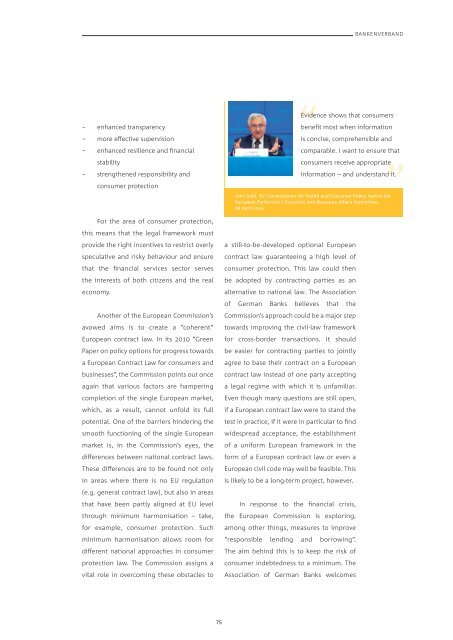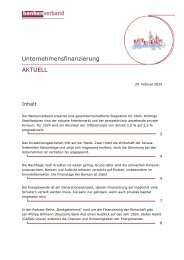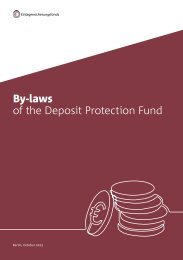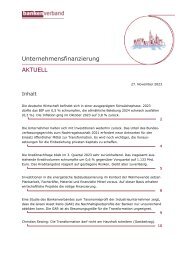Banks and Consumers
The Comprehensive Consumer Policy Scheme of the German Private Commercial Banks
The Comprehensive Consumer Policy Scheme of the German Private Commercial Banks
You also want an ePaper? Increase the reach of your titles
YUMPU automatically turns print PDFs into web optimized ePapers that Google loves.
BANKENVERBAND<br />
−<br />
−<br />
−<br />
−<br />
enhanced transparency<br />
more effective supervision<br />
enhanced resilience <strong>and</strong> financial<br />
stability<br />
strengthened responsibility <strong>and</strong><br />
consumer protection<br />
Evidence shows that consumers<br />
benefit most when information<br />
is concise, comprehensible <strong>and</strong><br />
comparable. I want to ensure that<br />
consumers receive appropriate<br />
information – <strong>and</strong> underst<strong>and</strong> it.<br />
John Dalli, EU Commissioner for Health <strong>and</strong> Consumer Policy, before the<br />
European Parliament‘s Economic <strong>and</strong> Monetary Affairs Committee,<br />
28 April 2010.<br />
For the area of consumer protection,<br />
this means that the legal framework must<br />
provide the right incentives to restrict overly<br />
speculative <strong>and</strong> risky behaviour <strong>and</strong> ensure<br />
that the financial services sector serves<br />
the interests of both citizens <strong>and</strong> the real<br />
economy.<br />
Another of the European Commission’s<br />
avowed aims is to create a “coherent”<br />
European contract law. In its 2010 “Green<br />
Paper on policy options for progress towards<br />
a European Contract Law for consumers <strong>and</strong><br />
businesses”, the Commission points out once<br />
again that various factors are hampering<br />
completion of the single European market,<br />
which, as a result, cannot unfold its full<br />
potential. One of the barriers hindering the<br />
smooth functioning of the single European<br />
market is, in the Commission’s eyes, the<br />
differences between national contract laws.<br />
These differences are to be found not only<br />
in areas where there is no EU regulation<br />
(e.g. general contract law), but also in areas<br />
that have been partly aligned at EU level<br />
through minimum harmonisation – take,<br />
for example, consumer protection. Such<br />
minimum harmonisation allows room for<br />
different national approaches in consumer<br />
protection law. The Commission assigns a<br />
vital role in overcoming these obstacles to<br />
a still-to-be-developed optional European<br />
contract law guaranteeing a high level of<br />
consumer protection. This law could then<br />
be adopted by contracting parties as an<br />
alternative to national law. The Association<br />
of German <strong>Banks</strong> believes that the<br />
Commission’s approach could be a major step<br />
towards improving the civil-law framework<br />
for cross-border transactions. It should<br />
be easier for contracting parties to jointly<br />
agree to base their contract on a European<br />
contract law instead of one party accepting<br />
a legal regime with which it is unfamiliar.<br />
Even though many questions are still open,<br />
if a European contract law were to st<strong>and</strong> the<br />
test in practice, if it were in particular to find<br />
widespread acceptance, the establishment<br />
of a uniform European framework in the<br />
form of a European contract law or even a<br />
European civil code may well be feasible. This<br />
is likely to be a long-term project, however.<br />
In response to the financial crisis,<br />
the European Commission is exploring,<br />
among other things, measures to improve<br />
“responsible lending <strong>and</strong> borrowing”.<br />
The aim behind this is to keep the risk of<br />
consumer indebtedness to a minimum. The<br />
Association of German <strong>Banks</strong> welcomes<br />
75


















